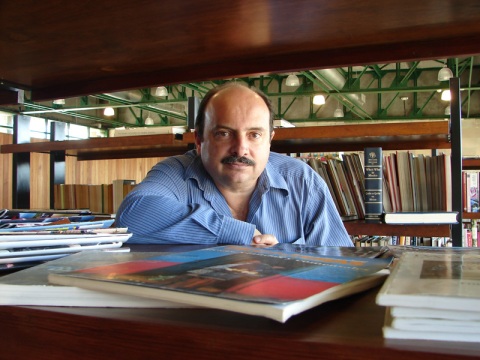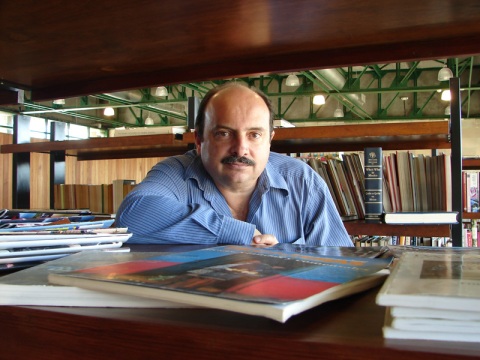We continue our special Mexican Week feature this week with an interview with Mexican author and editor Federico Schaffler!
Federico Schaffler interview by Charles Tan
First off, how did you first get into science fiction and fantasy?
I think that the main reason for getting into these genres was that as a child I watched a bunch of great TV shows like Star Trek (when originally aired, so you can now guess my age), Twilight Zone, The Invaders, Land of the Giants, Time Tunnel, UFO, Voyage to the bottom of the sea, Lost in Space, Man from U.N.C.L.E. and the Six Million Dollar man, among others. Afterwards, when I was around 12 years old, I began to buy and read Spanish pulp pocketbooks that managed to get to Mexico. I think I must have read around some 400 of them.
But most importantly, when I was in my first year of secondary school, that would be 7th for the US education system, I had to turn in a book report every month to my Spanish teacher. Because I already read a lot, I asked him if I could just tell him what I read and instead turned in a short story to get my grade. He agreed and that was the beginning of my writing career.
What’s the appeal of the genre for you?
The fantastic, being able to visit strange worlds and new civilizations (I wonder where I picked up that). The freedom to write what my imagination comes up without restraining myself to the boring reality that most of the time surrounds us. Being able to share my stories with whoever might read them.
Regarding terminologies, do you have a preferred term for science fiction and fantasy? For example, what’s your reaction when you hear the term speculative fiction? Magic-realism?
I´m very fond of Science Fiction, but can live with speculative fiction. Magic-realism is another species, vaguely related to SF, which I find difficult to relate to, but nonetheless admire. Sometimes I find that “science fiction writer” sets me apart, but it can also be an obstacle when I write essays, history books, chronicles or mostly the yearly reports of some of the Mayors of my city, Nuevo Laredo, when I have worked in the city government. Journalists more than once used my SF background to label those state of municipal affairs reports as “unbelievable science fiction”. It did not matter much to me because I got paid anyway.
What’s the field there like?
Right now? Almost inexistent. We had a very strong movement during the nineties, when we founded the Mexican Association of Science Fiction and Fantasy Writers, AMCYF, of which I was the first president. We also published magazines, held national short story awards, had several conventions and were recognized in national magazines, invited to international book fairs, published many books and were acknowledged in other countries. Sadly, this momentum came practically to a halt in 2000 after a fiercely fought campaign to preside AMCYF. After that, almost everyone went their own way and several authors kept the flame burning, but not me. I had a 10 year hiatus when I barely wrote because I had to work on other things.
But now I´m back and even though a part of me is strongly pushing me to once again put on the promoter and editor cap, as well to once again conduct a genre literary workshop (I coordinated the Terra Ignota literary workshop from 1990 to 2002), I think it´s time to do some serious writing of my own.
Here in the Philippines, there’s a predisposition for short stories rather than novels. Is that also the case there?
Yes, even though it is common knowledge that novels are easier to sell to the publishing houses and many have been able to appear to wider markets, but not with a SF label. Short stories can be found in personal collections, very few anthologies, electronic and printed magazines and blogs. Several novels have been published in Spain and that has opened up some doors that still are difficult to cross. Others prefer not to be labeled and have managed to publish in general collections.
Could you tell us more about the Mexican SF anthology that you edited, Mas alla de lo imaginado?
It was the first anthology published in Mexico that had only stories from Mexican writers. The National Council of the Arts, CONACULTA, by way of the Tierra Adentro Cultural Program, commissioned me in 1990 to prepare what eventually came to be three volumes, with 42 different authors, the youngest of whom was 17 and the eldest 72. The first two volumes appeared in 1991 and immediately sold out. The third appeared in 1994 and the fourth and fifth volumes never were published.
Mas alla de lo imaginado, or MADLI, as we call it, served as a loud wakeup call that motivated new writers, at the same time that it served as a common ground for those of us who already wrote and published but were not widely known about.
Many of the authors in MADLI later on garnered national or international literary awards, were published in Mexico and other countries and became household names for the SF community.
What was your criteria in selecting the stories for all three volumes?
I wanted to show a wide range of well written stories, most of them dealing directly with Mexican themes or characteristics. Many stories were intimate, other galaxy spanning and several very well could be included in other non-genre anthologies. I tried to balance new voices with established writers and sought stories from many sources, among them the Premio Puebla, a well known SF short story competition that began in 1984.
How would you describe Mexican science fiction and fantasy?
Mexican science fiction is more about how people react or is affected by technology, mainly because we have a very poor scientific education level and we are consumers and not developers of scientific advancements or technological innovations. There are more SF stories with Mexican space heroes written by non-Mexicans than those that are written in our country.
Who are some of the Mexican writers we should be reading?
Alberto Chimal, José Luis Zárate, Gerardo Porcayo, Pepe Rojo and Bernardo “Bef” Fernandez have been publishing widely and have a strong group of followers. Some of the lesser know authors beyond our borders are also very good, among them Hector Chavarria, Irving Roffe, Guillermo Lavin, Jose Luis Velarde and Gabriel Trujillo. You can search for stories by them and many others mainly in the Axxon webpage, an Argentinian SF electronic magazine that has been publishing since the early nineties and has over 225 issues at their website (axxon.com.ar) with Spanish speaking authors from many countries around the world.
When it comes to your writing, what’s the appeal of the short story format for you?
I originally found it a lot easier to tell a story that had the appeal of its short length. Now, I have to force myself to go back to the basics, regarding the scope and length of the story, because they started getting longer and longer. This makes me think that I might be ready to finish one of the several novels I have begun over the years and that remain unfinished.
How would you describe your own fiction?
First of all, I want it to entertain, to surprise the reader, to leave them sometimes with a smile and other times thinking. I try to find and use humorous or unexpected twists, some time even being cruel to the characters. I almost always see that the story, while universal, contains particular aspects of Mexican culture, ideology, traditions or customs that try to make it different from others.
What’s the publishing industry in Mexico like?
I think it´s the same as in other countries of Latin America. Publishers want sure-fire bets, mostly with books from well recognized authors. That is why it is easier to find new books (at least because of their publication date and not because of when they were written) by Isaac Asimov, Orson Scot Card, Ray Bradbury, Stephen King, Arthur C. Clarke and other authors instead of books by Mexican authors who do not have a wide fan base. Magazines, on the other hand, are more open to publish stories from new authors or from those with at least some name value.
What’s your opinion on the upcoming anthology Three Messages and a Warning (http://smallbeerpress.com/forthcoming/2011/03/23/three-messages-and-a-warning/#more-8815)?
I just got it a few days ago, when I attended a book presentation in San Antonio, Texas, when I finally got to personally meet one of the editors, Eduardo Jimenez Mayo, as well as five of the authors, two of whom were already friends of mine. I finished the book in a couple of days and highly recommend it for anyone who wants to have a broad panorama of current Mexican fantastic fiction. I also hope that Eduardo and Chris N. Brown can soon publish a follow-up volume because there are many more authors that were not included who should be well known to English readers.
What projects are you currently working on?
I´m working in translating into English some of my stories, as well as and writing new ones directly in this language. I am also outlining two novels that I expect to begin soon (I still do not know which one will be first). I am also trying to finish a space opera novella that I started and left unconcluded a dozen years ago. I recently finished a book of flash fiction, called “From Zero to a Hundred” that has stories that have a word count between 0 and 100 and I have a pet project of writing this year twelve stories, ranging from one to twelve pages long, on January 1, February 2, March 3 and so on (1/1, 2/2, 3/3…) so I can finish with a 78 page chapbook. But most importantly I will try to break into international markets, by publishing in the US, Canada, Spain and Argentina, among other countries.
Federico Schaffler was founding president of the Mexican Association of Science Fiction and Fantasy Writers, AMCyF, in 1992. He also edited the first anthology of original SF stories from Mexico, “Mas Alla de lo Imaginado” (3 volumes, 1991-1993), as well as another 22 books that range from essays to short story collections and chronicles. In 2011 he was designated Emeritus creator of the State of Tamaulipas, Mexico, due to his writing and editorial work for over 28 years. He was once a member of Science Fiction Writers of America, in the early 1990´s, when he gained admission after successfully arguing that America is the whole continent, and not only the USA, and that as a Mexican national he was eligible to be a member. After that, the SFFWA eventually changed their admission guidelines.


Federico, congratulations on the recognition received! I’m very proud of what you have acomplished and certainly expect to see many more fantastic stories to spark from your great imagination. Keep them coming! – RS